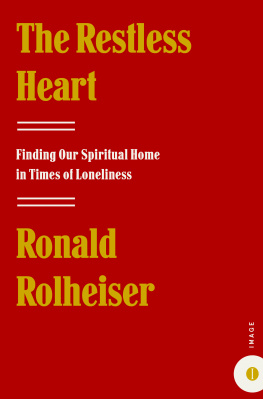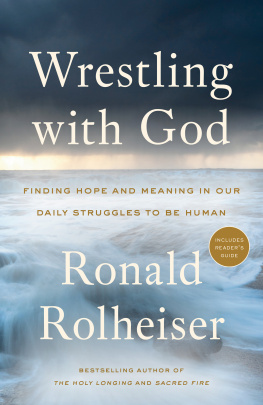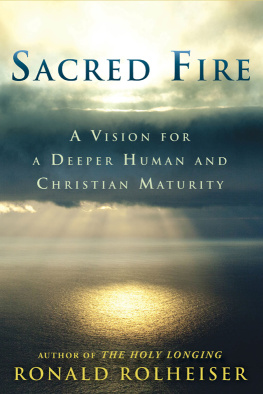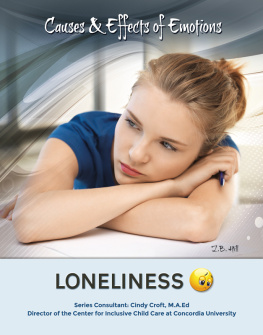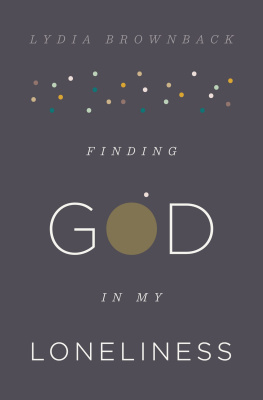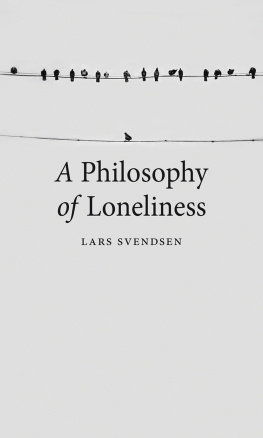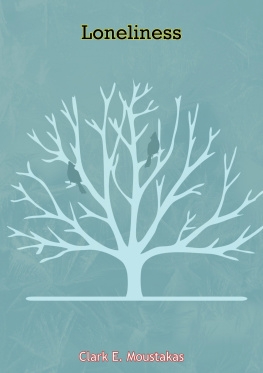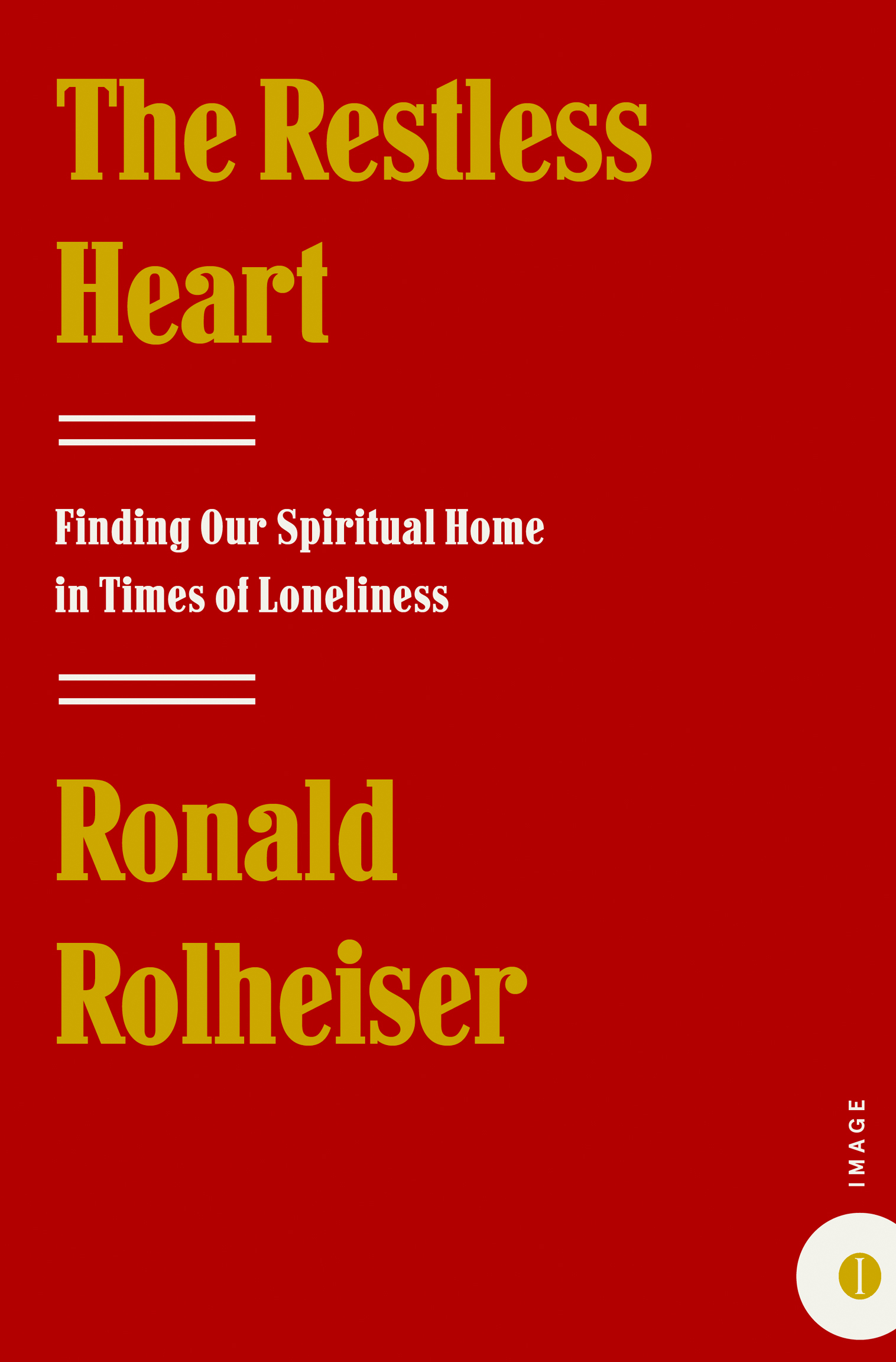
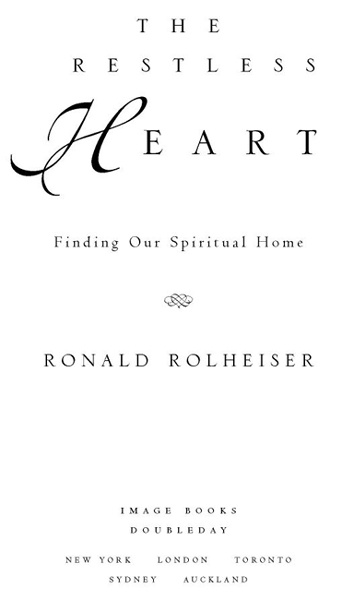
Table of Contents
PREFACE
On February 12, 1944, thirteen-year-old Anne Frank wrote these words in her now-famous diary:
Today the sun is shining, the sky is a deep blue, there is a lovely breeze and I am longingso longing for everything. To talk, for freedom, for friends, to be alone.
And I do so long... to cry! I feel as if I am going to burst, and I know that it would get better with crying; but I cant, Im restless, I go from room to room, breathe through the crack of a closed window, feel my heart beating, as if it is saying, cant you satisfy my longing at last?
I believe that it is spring within me. I feel that spring is awakening. I feel it in my whole body and soul. It is an effort to behave normally. I feel utterly confused. I dont know what to read, what to write, what to do. I only know that I am longing.
Inside each of us, at the center of our lives, there is a tension, an ache, an insatiable fire that cannot be quieted. We are always longing. Sometimes this is focused on a person, particularly if we are in a love that is not consummated; at other times we experience this as a longing to attain something.
Often, though, it is a longing with no clear focus and no clear name, an aching that cannot be pinpointed or described. Like Anne Frank, we only know that we are longing, restless, full of disquiet.
Why is it so difficult to be restful and satisfied? What is it within the human spirit that makes us so incurably erotic, so full of wanderlust, so easily given over to depressive nostalgia? Shakespeare talked of immortal longings, Karl Rahner speaks about the torment of the insufficiency of everything attainable.
This book examines these longings from both a secular and a religious point of view and attempts to provide some perspectives from which we can better understand them, showing that this dis-ease within us can be a force for greatness or for destruction. St. Augustine once prayed: You have made us for yourself, Lord, and our hearts are restless until they rest in you. This book attempts to explain some of what that means.
Karl Rahner, a twentieth-century admirer of Augustine, once said that in the torment of the insufficiency of everything attainable, we come to realize that, in this life, all symphonies must remain unfinished. This book is written for those who struggle with those words.
This book was first published more than twenty years ago. I was young then, lonely myself, restless like all young people, and still searching for many things. I wrote it very much out of my own experience, while still under thirty years of age, extremely idealistic, and, like a young Sren Kierkegaard, trying to carry my solitude at a noble height. As I reread these pages, touching them up somewhat for this current edition, I am reminded of the truth of something I once heard Raymond Brown, the great scripture scholar, say late in his life. Commenting on growing older, Brown stated that sometimes, later on in life, we look back on something we wrote in the passion, eagerness, idealism, and immaturity of our youth, and we ask: How could I ever have had the nerve and the immaturity to say that? However, later on still, when we realize more and more how timid our maturity has made us, we look more fondly on that same work and say: Thats the best thing I ever did! I had both those feelings, the shame and the pride, as I read again these pages that I wrote when I was much younger.
And one last feeling: Jane Urquhart, in rereading one of her own books more than twenty years after she first wrote it, made this comment: It is tremendously satisfying to be able to reacquaint myself with the young woman who wrote these tales, and to know that what was going on in her mind intrigues me still. I can say the same thing, exactly, as I bring to a new edition words that I wrote when I was still a lonely, restless young man.
RON ROLHEISER
ROME,ITALY
FEBRUARYI, 2004
PART ONE
THE NATURE OF LONELINESS

THE PROBLEM
No person has ever walked our earth and been free from the pains of loneliness. Rich and poor, wise and ignorant, faith-filled and agnostic, healthy and unhealthy have all alike had to face and struggle with its potentially paralyzing grip. It has granted no immunities. To be human is to be lonely.
To be human, however, is also to respond. The human person has always responded to this pain. The response has varied greatly. Sometimes loneliness has led us to new heights of creativity, and sometimes it has led us to drugs, alcohol, and emotional paralysis; sometimes it has led us to the true encounter of love and authentic sexuality, sometimes it has led us into dehumanizing relationships and destructive sexuality; sometimes it has moved us to a greater depth of openness toward God and others, to fuller life, and sometimes it has led us to jump off bridges, to end life; sometimes it has given us a glimpse of heaven, sometimes it has given us a glimpse of hell; sometimes it has made the human spirit, sometimes it has broken it; always it has affected it. For loneliness is one of the deepest, most universal, and most profound experiences that we have.
Even if you are a relatively happy person, a person who relates easily to others and who has many close friends, you are probably still lonely at times. If you are a very sensitive person, who feels things deeply, you are probably, to some degree, lonely all the time.
However, most of us appear reluctant to admit our loneliness, even to ourselves. All of us seem to have a congenital need to deny that we experience loneliness and that it is, in some way, responsible for many of our feelings, actions, and pursuits. We distance ourselves from it, not admitting to ourselves and to others that we are lonely. We admit that we are lonely only with a feeling of shame and weakness. Also, most of us feel that loneliness is not something that should affect normal, healthy persons. We identify it much more with those that our society considers marginal persons, namely, the elderly, the unwanted, the unlovable, the alienated, and those others who for one reason or another seem divorced from the mainstream of life. We never imagine for a moment that we should be subject to intense feelings of loneliness.
Under the surface, though, we are not easily fooled by our own facade of strength. We hurt, and we live in pain, in loneliness, damned loneliness. Unfortunately, too, the cost of our self-deception is high. We pay a heavy price for not admitting our loneliness, facing it squarely, and grappling with it honestly. Loneliness, as we shall see, is most dangerous when it is not recognized, accepted, and worked through creatively. It is then that it wreaks havoc with our lives. Conversely, too, we shall see that it is a tremendously creative and humanizing force when it is recognized and addressed correctly.
THE HIDDEN FACE OF LONELINESS
Despite our denials of loneliness, evidence for it is everywhere. It does not require professional insight, nor much documentation, to affirm the fact that as a society, and as individuals, we are lonely. All we need to do is to look around ourselves, or deeply inside ourselves, to see evidence of loneliness, staggering, painful evidence. For example, even a quick look at the grim statistics that document the use of alcohol, drugs (both hard and soft), the sale of pornographic materials, and the number of suicides tells us that we are a lonely people, living in pain. In our western world, we consume millions of pounds of tranquilizers and barbiturates annually. At the same time each year, we see an increase in the number of persons who are seeking professional counseling, suffering from nervous strain and mental disorders, getting involved in encounter groups, sensitivity groups, religious fads, newer forms of communal and marital living, and promiscuous sexuality.
Next page
